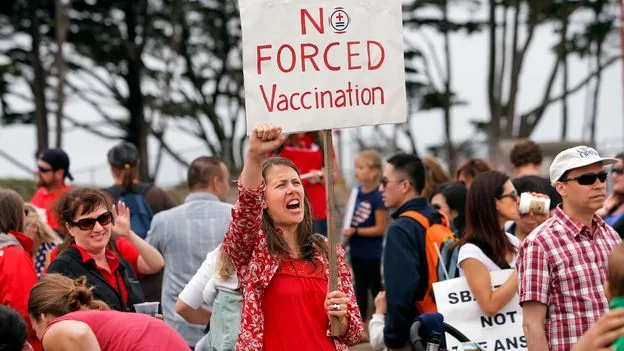
Unearthing the Hidden History of the Anti-Vaccine Movement
2025-09-07
Author: Nur
Is Vaccine Skepticism a Modern Illness?
Vaccine skepticism may appear to be a contemporary issue, but its roots stretch far deeper into history than many realize. For centuries, humanity has been grappling with deadly diseases and their devastating impacts, none more notorious than smallpox.
The Deadly Legacy of Smallpox
Smallpox, a ruthless viral affliction, is estimated to have claimed 300 million lives in the 20th century alone. It inflicted a gruesome fate on one-third of its victims, leaving many blind and eternally scarred. Historical figures such as Emperor Joseph I of Austria and Queen Mary II of England were among its tragic victims. By the 1800s, smallpox was responsible for over 400,000 deaths annually worldwide.
A Revolutionary Discovery: The First Vaccine
In 1796, UK physician Edward Jenner made a groundbreaking leap in medical science by developing the smallpox vaccine. Observing that milkmaids seemed immune, he cleverly used cowpox material to inoculate an eight-year-old boy, marking the dawn of vaccination. Jenner's hope was profound: he believed that the eradication of smallpox was within reach. This vision came true in 1980 when the World Health Organization officially declared smallpox eradicated.
The Battle Against Vaccine Hesitancy
While vaccines have saved an estimated 154 million lives in the last half-century, public opposition has grown alarmingly. Recent events, such as heated Senate hearings involving health officials like Robert F. Kennedy Jr. and Florida's push to end vaccine mandates, highlight a resurgence in skepticism. But is this hesitance a new phenomenon?
A Longstanding Struggle
Vaccine resistance isn’t a modern construct. In the early 1800s, after demonstrating a 95% efficacy rate against smallpox, Jenner’s success sparked the formation of anti-vaccination leagues. These opponents produced pamphlets with chilling titles like "Vaccination, a Curse," and staged protests that echo today’s anti-vaccine movements.
Protests against vaccination have been seen throughout history, including riots in 1850s England and Supreme Court cases in 1905 America, where vaccine mandates were upheld as constitutional.
Perceptions of Inoculation
Opposition even predated the invention of vaccines; the 1720s brought about variolation, an early form of inoculation that faced criticism for being unnatural. Critics, including clergymen who viewed disease as divine punishment, argued vehemently against inoculation. The perception that vaccines might alter human essence can be traced back to early illustrations depicting vaccinated patients transforming into cows.
Accusations labeling vaccines as poison became a rallying cry for protests, exemplified by banners proclaiming that a 'felon's cell is preferable to a poisoned babe.' Such notions not only misled the public but also thwarted the efforts of dedicated medical professionals.
The Quest for Medical Freedom
The anti-vaccine movement also reflects broader societal concerns regarding bodily autonomy. In Sweden, resistance to smallpox vaccination was stark; only 40% were vaccinated in Stockholm as an outbreak swept through in 1874.
Vaccination Saves Lives!
Despite the ongoing opposition, vaccinations have dramatically reduced infant and child mortality rates, particularly against smallpox. Yet, anti-vaccine factions continued to deny this evidence, attributing health improvements to sanitation instead.
The Resurgence of Misinformation
With misinformation about vaccines persisting through the centuries, the World Health Organization has identified vaccine hesitancy as a significant global health threat. Measles outbreaks in the U.S. are a worrying sign, as vaccination rates falter, echoing past challenges. Each measles case projects to 12-18 additional infections, revealing why maintaining herd immunity is critical.
A Historical Echo
Today’s anti-vaccine narratives mirror Victorian-era fears and misconceptions, showcasing the enduring battle against medical misinformation. As experts warn, if these unfounded beliefs persist, the future may be bleak, with outbreaks just a breath away.
In summary, understanding the deeply rooted history of vaccine skepticism may hold the key to addressing current hesitancy and ensuring the public embraces vaccinations for their own well-being.



 Brasil (PT)
Brasil (PT)
 Canada (EN)
Canada (EN)
 Chile (ES)
Chile (ES)
 Česko (CS)
Česko (CS)
 대한민국 (KO)
대한민국 (KO)
 España (ES)
España (ES)
 France (FR)
France (FR)
 Hong Kong (EN)
Hong Kong (EN)
 Italia (IT)
Italia (IT)
 日本 (JA)
日本 (JA)
 Magyarország (HU)
Magyarország (HU)
 Norge (NO)
Norge (NO)
 Polska (PL)
Polska (PL)
 Schweiz (DE)
Schweiz (DE)
 Singapore (EN)
Singapore (EN)
 Sverige (SV)
Sverige (SV)
 Suomi (FI)
Suomi (FI)
 Türkiye (TR)
Türkiye (TR)
 الإمارات العربية المتحدة (AR)
الإمارات العربية المتحدة (AR)